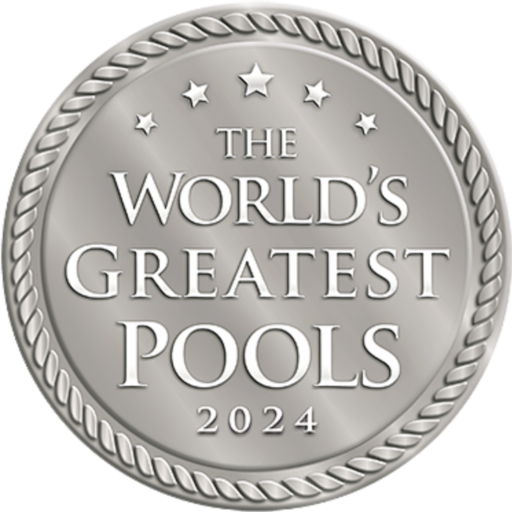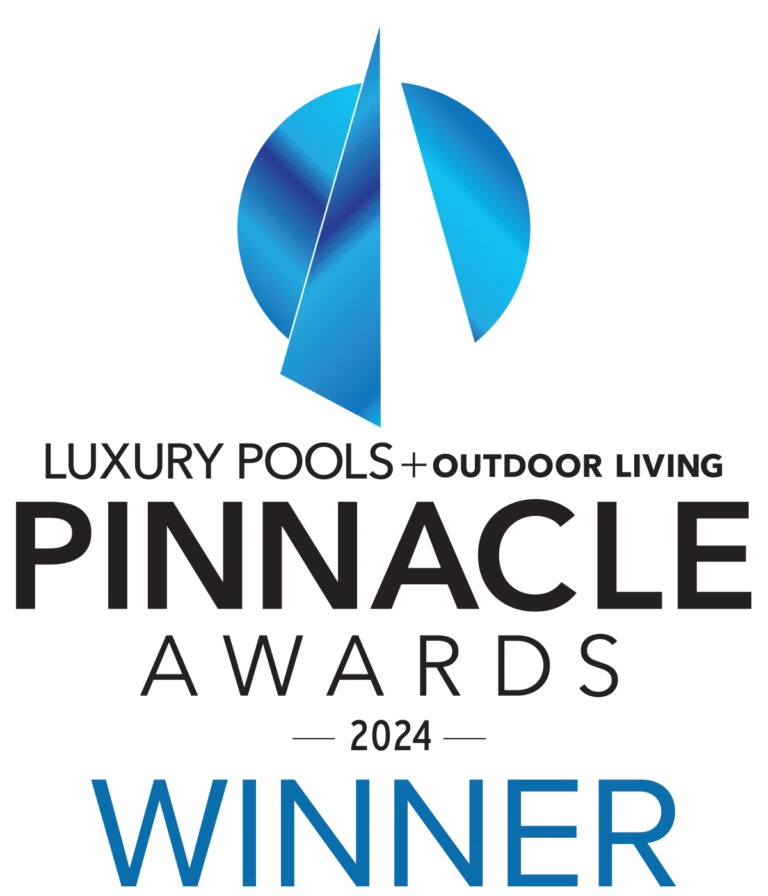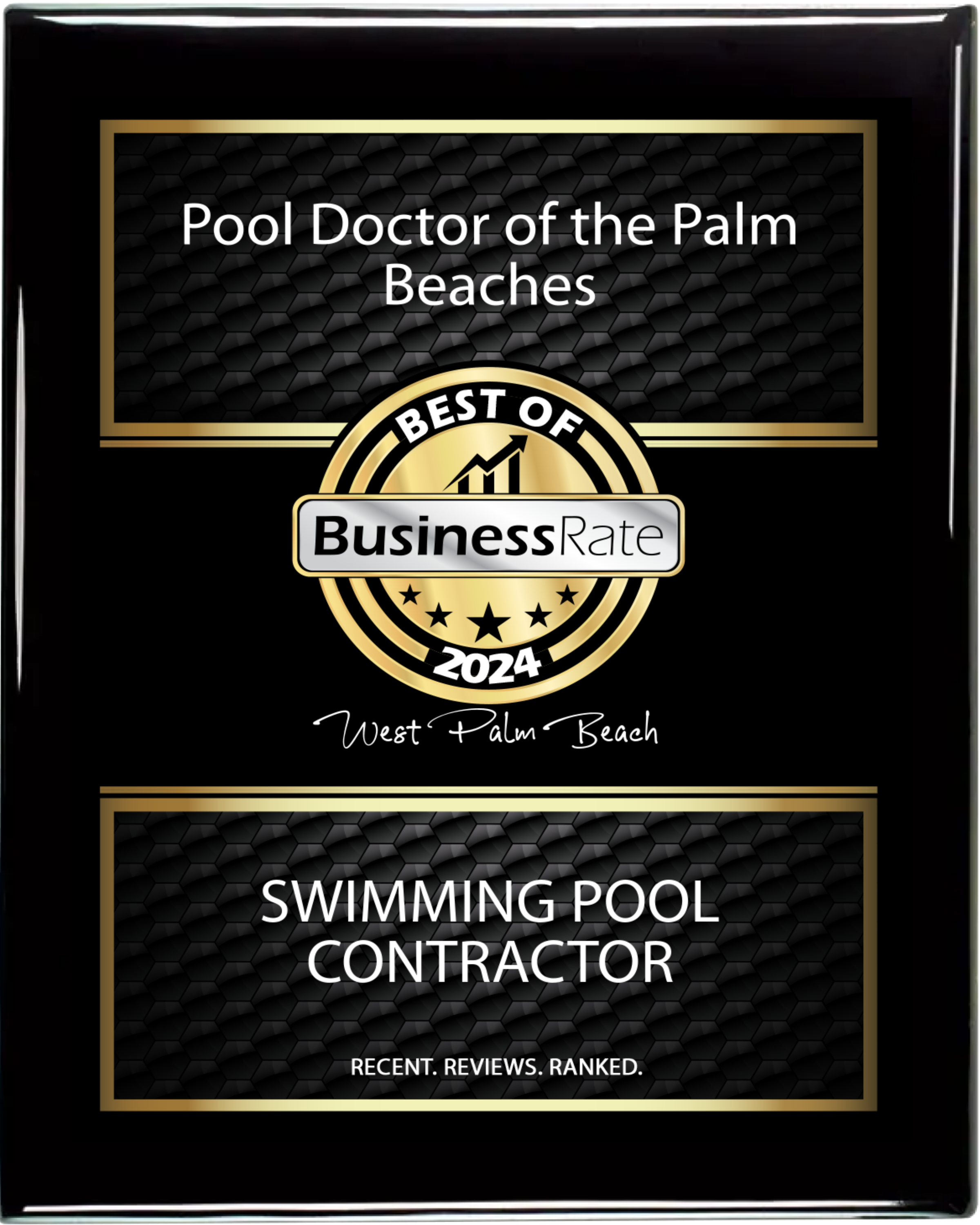Pool screen enclosures deliver significant value in 2025, with ROI ranging from 50-80%. You’ll benefit from 70% reduced cleaning costs, 50% lower chemical usage, and improved property value of 5-8%. The modern installations feature advanced powder-coated aluminum and specialized mesh, offering superior protection against UV rays, debris, and unauthorized access. While initial costs range from $8,000-$15,000, you’ll reach break-even within 5-7 years through substantial maintenance savings and increased home value. Let’s investigate the technological advancements transforming pool enclosures.
Key Takeaways
- Modern pool enclosures offer significant cost savings, with a 70% reduction in cleaning costs and extended equipment lifespan justifying initial investment.
- Enhanced safety features protect children and prevent unauthorized access, making them essential for responsible pool ownership in 2025.
- Environmental benefits include 50% reduction in chemical and water usage, leading to substantial resource conservation and lower maintenance costs.
- Property values increase 5-8% with quality enclosures, offering strong ROI and faster selling times in the current market.
- Advanced materials and designs provide superior protection against UV rays, insects, and debris while requiring minimal maintenance.
The Evolution of Pool Screen Technology and Materials
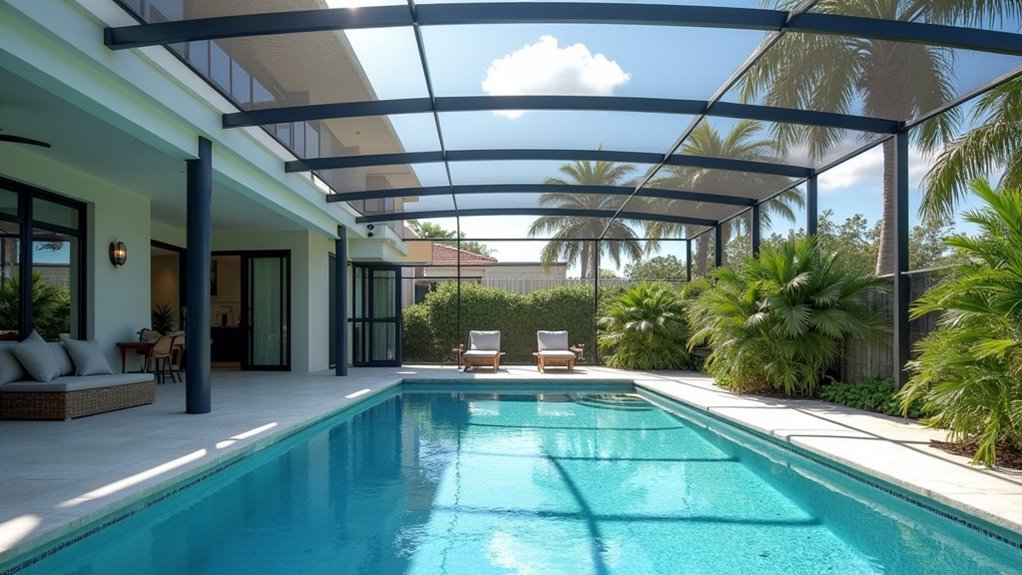
Over the past several decades, pool screen enclosure technology has transformed from basic aluminum frames with fiberglass mesh to sophisticated systems incorporating advanced materials and engineering principles. You’ll find that historical advancements in manufacturing processes have led to stronger, more durable components that resist corrosion and withstand extreme weather conditions.
Material innovations have introduced powder-coated aluminum alloys that offer superior strength-to-weight ratios and increased durability against UV exposure. Today’s screening materials feature specialized mesh designs that block smaller insects while maintaining ideal airflow and visibility. Modern pool enclosures also incorporate impact-resistant panels and advanced fastening systems that provide better structural integrity. These technological improvements have resulted in longer-lasting installations that require less maintenance and offer enhanced protection for your pool area.
Cost Analysis: Installation Vs Long-Term Savings

Three key financial factors drive the cost-benefit analysis of pool screen enclosures: initial installation expenses, maintenance costs, and long-term value appreciation.
While installation costs typically range from $8,000 to $15,000 depending on size and materials, you’ll recover this investment through substantial long-term savings. You’ll reduce pool cleaning frequency by 70%, cutting your annual maintenance expenses by $1,200 to $2,000. The enclosure also protects your pool equipment, extending its lifespan by 40-50%.
Your property value will increase by 5-8% with a well-maintained screen enclosure. Moreover, you’ll save on chemical costs, as the screening reduces evaporation and debris contamination. When factoring in reduced energy costs from lower pump usage, you can expect to break even on your investment within 5-7 years.
Safety and Protection Benefits for Families
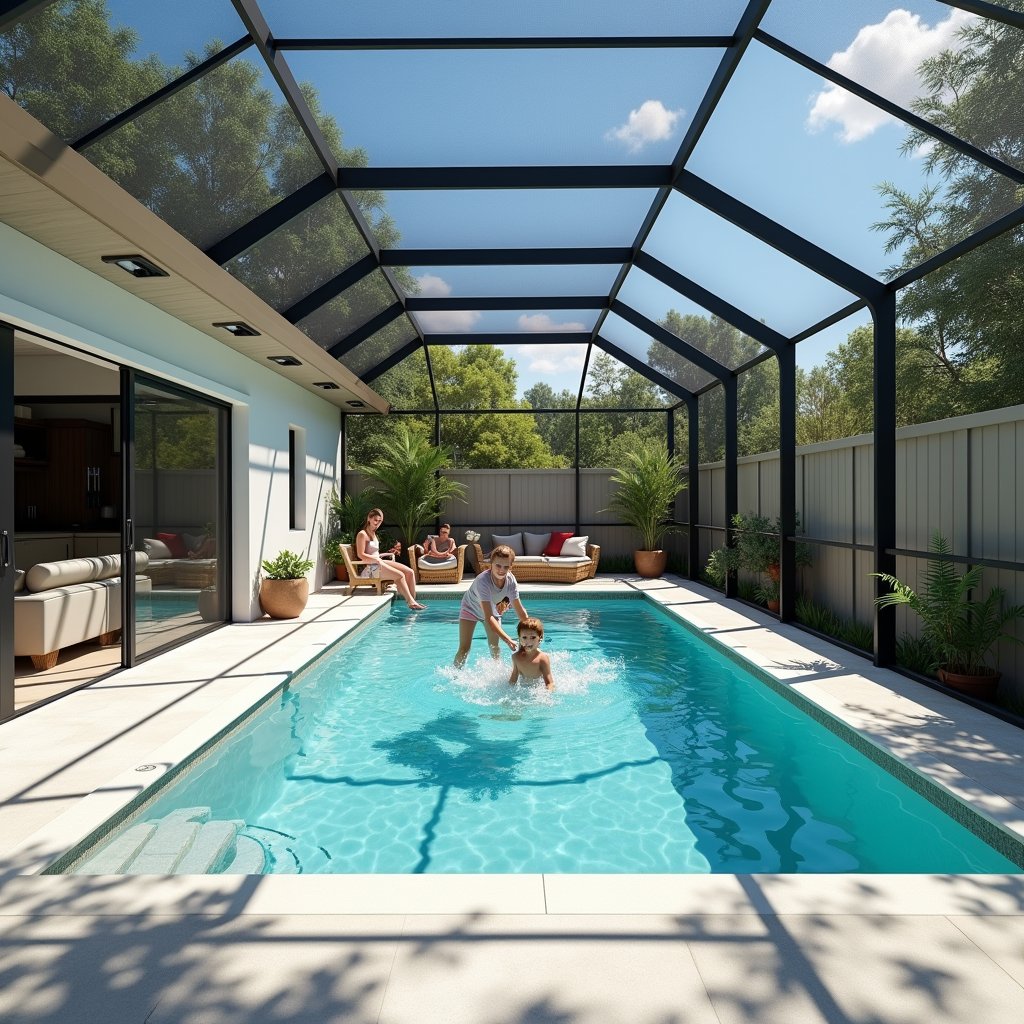
Beyond financial advantages, pool screen enclosures provide extensive safety features that protect your family and guests. You’ll benefit from a physical barrier that prevents unsupervised pool access, greatly reducing drowning risks and enhancing child protection measures. The enclosure’s mesh panels block harmful UV rays, protecting your family from excessive sun exposure during swim sessions.
Your screen enclosure acts as a vital safety net, keeping out animals, debris, and unwanted intruders. This multi-layered family safety approach includes preventing children from accessing the pool area without adult supervision and eliminating the risk of wildlife entering your pool space. You’ll also avoid dangerous slip hazards from wet deck surfaces, as the enclosure helps manage water splashing and maintains a controlled swimming environment.
Environmental Impact and Energy Efficiency
Pool screen enclosures deliver significant environmental benefits while reducing your energy consumption costs. By implementing sustainability practices through screen enclosure installation, you’ll contribute to energy conservation while maintaining a comfortable pool environment.
- Your pool screen enclosure reduces chemical evaporation by up to 50%, meaning you’ll use fewer pool chemicals, which benefits both the environment and your wallet.
- The mesh screening filters harmful UV rays, lowering water temperature fluctuations and reducing the energy needed for pool heating and cooling systems.
- You’ll decrease your pool pump’s runtime by 30% since less debris enters the water, leading to significant energy savings.
- Screen enclosures minimize water evaporation by 50%, conserving this essential resource and reducing the frequency of pool refills, especially important in drought-prone areas.
Maintenance Requirements and Durability Factors
While screen enclosures are built to last, their longevity depends on proper maintenance and several key durability factors. You’ll need to take into account regular cleaning, inspection, and occasional repairs to enhance your enclosure’s lifespan. When comparing maintenance costs across different screen types, you’ll find significant variations in durability and upkeep requirements.
| Component | Maintenance Frequency | Durability Rating | Average Lifespan |
|---|---|---|---|
| Aluminum Frame | Annual inspection | High | 15-20 years |
| Screen Mesh | Bi-annual cleaning | Medium | 7-10 years |
| Hardware | Quarterly check | Medium-High | 10-12 years |
| Fasteners | Annual tightening | High | 12-15 years |
Regular pressure washing and prompt repair of any tears or damage will prevent costly replacements. Today’s advanced materials offer superior durability compared to older installations, potentially reducing your long-term maintenance costs.
Property Value Enhancement and Market Trends
Investing in proper maintenance pays off not just in durability, but also in real estate value. A well-maintained pool screen enclosure greatly impacts property appreciation, especially in regions where outdoor living spaces are highly valued. Current market trends show that buyer preferences strongly favor homes with protected outdoor entertainment areas.
- Properties with screened pool enclosures typically see a 5-8% increase in market value compared to similar homes without enclosures
- Real estate data indicates faster selling times for homes featuring quality pool screen installations
- Buyer preferences in 2025 demonstrate increased demand for homes with built-in mosquito protection and improved outdoor living spaces
- Market analysis reveals that pool enclosures offer an average ROI of 50-80%, making them a sound investment for property value improvement
Smart Features and Modern Customization Options
Modern advances in screen enclosure technology have revolutionized customization possibilities, offering homeowners unprecedented control over their outdoor living spaces. You’ll find smart automation features that let you regulate ventilation, lighting, and temperature through your smartphone, creating the perfect environment year-round.
Today’s enclosures incorporate personalized aesthetics with customizable frame colors, screen patterns, and architectural details that complement your home’s design. You can choose from motorized retractable screens, integrated LED lighting systems, and climate sensors that automatically adjust to weather conditions. Advanced materials now offer improved UV protection while maintaining crystal-clear views of your pool area.
These smart features seamlessly integrate with your home’s existing automation systems, allowing you to create scheduled routines and monitor security through connected devices.
Frequently Asked Questions
Can Pool Screen Enclosures Be Partially Opened During Specific Weather Conditions?
Yes, you can modify your pool screen enclosure to accommodate different weather conditions. Many modern enclosures feature retractable panels or sliding sections that allow for partial opening. These screen adjustments help you manage airflow, temperature, and sun exposure. You’ll find options like motorized screens, removable panels, or manual sliding systems that let you customize your enclosure’s openness. However, it’s crucial to secure all components during severe weather events.
How Long Does the Initial Pool Screen Enclosure Installation Process Typically Take?
Your pool screen enclosure installation timeline typically ranges from 2-5 days, depending on several installation factors. The size of your pool area, design complexity, and weather conditions can affect completion time. You’ll find that basic rectangular enclosures usually take 2-3 days, while custom designs with special features might require 4-5 days. Your contractor’s crew size and experience level will also impact the complete installation duration.
Are Pool Screen Enclosures Covered by Standard Home Insurance Policies?
Most standard home insurance policies will cover your pool screen enclosure, but you’ll need to verify specific coverage details with your insurer. Many policies include screen enclosures under “other structures” coverage, typically at 10% of your home’s insured value. However, watch for policy exclusions related to wind damage or severe weather events. You might need extra endorsements or separate coverage depending on your location and the enclosure’s value.
Can Existing Pool Decks Support the Additional Weight of Screen Enclosures?
You’ll need a professional assessment of your existing pool deck before installing a screen enclosure. The deck’s structural integrity and load-bearing capacity are essential factors. In many cases, you’ll require deck reinforcement to handle the supplementary weight distribution of the enclosure’s framework. A structural engineer can evaluate your deck’s concrete thickness, rebar placement, and soil conditions to determine if modifications are necessary for safe installation and long-term stability.
What Permits Are Required for Installing a Pool Screen Enclosure?
You’ll need several permits and approvals before installing a pool screen enclosure. Most jurisdictions require a building permit, which involves submitting detailed construction plans and engineering drawings. Check your local permit requirements, as they may also mandate zoning permits, HOA approvals, and structural evaluations. Installation regulations typically cover height restrictions, setback requirements, and wind load specifications. Hire a licensed contractor who’s familiar with local codes to guarantee proper compliance and documentation.
